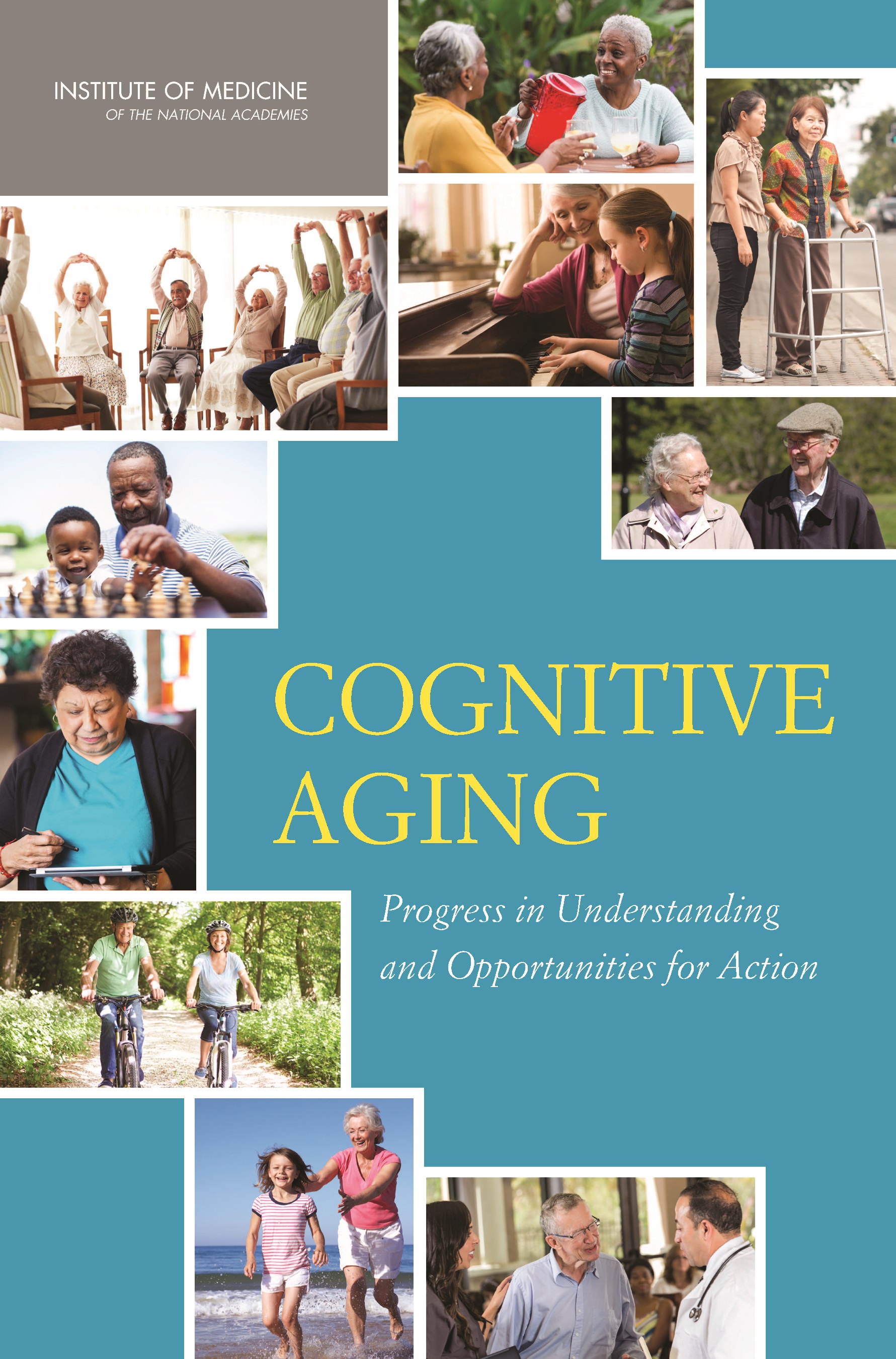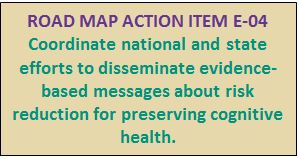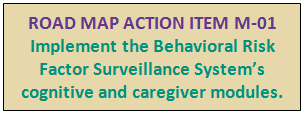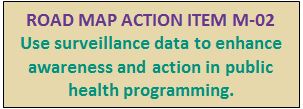| IOM Highlights Behaviors to Reduce Risk of Cognitive Decline
 Three key behaviors can protect cognitive functioning and promote healthy aging in older adults, according to a new report released by the Institute of Medicine. Cognitive Aging: Progress in Understanding and Opportunities for Action examines “cognitive aging” – the gradual and variable changes in mental functions that occur with age – and notes that based on the current state of the science, the risk of cognitive decline can be reduced by: Three key behaviors can protect cognitive functioning and promote healthy aging in older adults, according to a new report released by the Institute of Medicine. Cognitive Aging: Progress in Understanding and Opportunities for Action examines “cognitive aging” – the gradual and variable changes in mental functions that occur with age – and notes that based on the current state of the science, the risk of cognitive decline can be reduced by:
- Being physically active;
- Managing cardiovascular risk factors, including high blood pressure, diabetes, and smoking; and
- Regularly discussing and reviewing with a health care provider those health conditions and medications that might influence cognitive health.
 The report notes that individuals might also be able to protect their brains by being socially active, engaging in life-long learning, and getting adequate sleep. The report notes that individuals might also be able to protect their brains by being socially active, engaging in life-long learning, and getting adequate sleep.
The report encourages public health officials to disseminate key messages and promote activities that help maintain cognitive health. This mirrors an action item included in the Public Health Road Map, which was jointly developed by the Centers for Disease Control and Prevention (CDC) and the Alzheimer’s Association. The Road Map outlines 35 action steps for the public health community to promote cognitive functioning, address cognitive impairment, and meet the needs of caregivers – including disseminating messages about risk reduction.
Four Million Households in 13 States Have Individual Experiencing Memory Problems
 One in eight households in 13 states have at least one adult experiencing increased confusion or memory loss (ICML), according to new data from the Cognitive Module of the 2011 Behavioral Risk Factor Surveillance System (BRFSS). The data, published in Preventing Chronic Disease, also show that in the 13 states, 5.4 percent of households reported all adults in the home experienced ICML. Based on these results, the authors estimated that 4 million U.S. households across the 13 states have one or more adults with ICML, potentially affecting more than 10 million individuals. These data highlight the magnitude of cognitive decline and the need for public health officials to take action. For example, the authors note, “increasing awareness about recognition of signs and symptoms of cognitive decline . . . can allow household members to seek medical advice and plan for future needs.” One in eight households in 13 states have at least one adult experiencing increased confusion or memory loss (ICML), according to new data from the Cognitive Module of the 2011 Behavioral Risk Factor Surveillance System (BRFSS). The data, published in Preventing Chronic Disease, also show that in the 13 states, 5.4 percent of households reported all adults in the home experienced ICML. Based on these results, the authors estimated that 4 million U.S. households across the 13 states have one or more adults with ICML, potentially affecting more than 10 million individuals. These data highlight the magnitude of cognitive decline and the need for public health officials to take action. For example, the authors note, “increasing awareness about recognition of signs and symptoms of cognitive decline . . . can allow household members to seek medical advice and plan for future needs.”
Another article published in the journal found those aged 45 and older with ICML and functional difficulties – that is, those whose memory problems caused them to give up household activities or regularly interfered with their ability to work, volunteer, or engage in social activities – were significantly more likely to face greater health issues than those with ICML but no functional difficulties. Specifically, the data, from 21 states that used the BRFSS Cognitive Module in 2011, found they were more likely to report frequent poor health, frequent poor mental health, limited activity due to poor physical or mental health, and a need for more assistance. Interestingly, those with ICML and functional difficulties were younger than those with ICML and no functional difficulties, leading the authors to note the need for “examination of cognitive health issues at younger ages.”
Funding Available for BRFSS Module Usage in 2016
 Two optional modules of the annual state-based Behavioral Risk Factor Surveillance System (BRFSS) provide essential information for understanding the impact and burden of cognitive decline and caregiving. The Cognitive and Caregiver Modules provide state-specific data on increased confusion and memory loss as well as the burden faced by caregivers. Two optional modules of the annual state-based Behavioral Risk Factor Surveillance System (BRFSS) provide essential information for understanding the impact and burden of cognitive decline and caregiving. The Cognitive and Caregiver Modules provide state-specific data on increased confusion and memory loss as well as the burden faced by caregivers.
 In 2015, 35 states are using the Cognitive Module and 24 states are using the Caregiver Module. This is the highest number of states using either module in the same year. However, in order to obtain a usable national and regional dataset, those states not using the modules in 2015 should adopt these modules for their 2016 surveys. In 2015, 35 states are using the Cognitive Module and 24 states are using the Caregiver Module. This is the highest number of states using either module in the same year. However, in order to obtain a usable national and regional dataset, those states not using the modules in 2015 should adopt these modules for their 2016 surveys.
To help states cover the costs, funding is available from the Alzheimer’s Association through its Cooperative Agreement with the CDC. For more information about the funding – or for assistance in securing the Cognitive and/or Caregiver Module in your state – contact Molly French (mfrench@alz.org).
Reminder: Webinar Tomorrow on Data Usage to Promote Older Adult Health
 The Association of State and Territorial Health Officials (ASTHO) is hosting a webinar tomorrow, Tuesday, May 5, 2015, from 3:00-4:00 p.m. EDT. Please register online. The Association of State and Territorial Health Officials (ASTHO) is hosting a webinar tomorrow, Tuesday, May 5, 2015, from 3:00-4:00 p.m. EDT. Please register online.
 Using Data for Action to Promote the Health of Older Adults will explore how to use data to promote the relationship between chronic conditions and cognitive health. The webinar will provide information on the Behavioral Risk Factor Surveillance System (BRFSS) and the CDC’s Chronic Disease Indicators, strategies to utilize the data from these resources, and the role public health agencies can play in promoting healthy aging. Using Data for Action to Promote the Health of Older Adults will explore how to use data to promote the relationship between chronic conditions and cognitive health. The webinar will provide information on the Behavioral Risk Factor Surveillance System (BRFSS) and the CDC’s Chronic Disease Indicators, strategies to utilize the data from these resources, and the role public health agencies can play in promoting healthy aging.
Please be sure to register online, mark your calendars, and forward to any interested colleagues.
The Alzheimer’s Public Health E-News is supported by Cooperative
Agreement #5U58DP002945-05 from the Centers for Disease Control and Prevention
(CDC). Its contents are solely the responsibility of the Alzheimer’s
Association and do not necessarily represent the official views of the CDC.
For subscription services or to view previous issues of Alzheimer’s Public Health News, please visit http://alz.org/publichealth/public-health-news.asp or contact John Shean (jshean@alz.org).
|